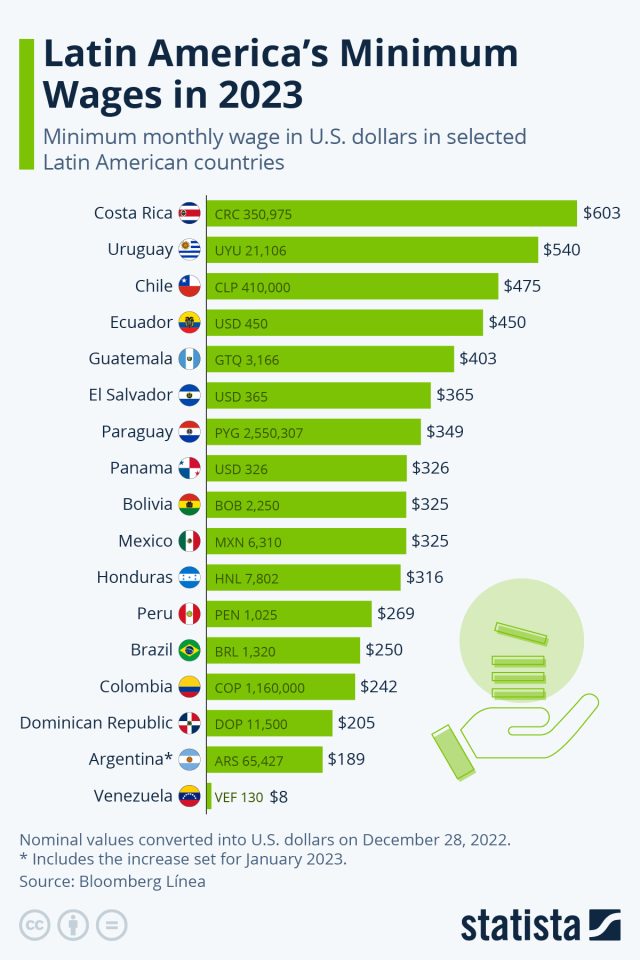 Jamaica’s Minimum Wage Leap: A Mid-Tier Contender in Latin America
Jamaica’s Minimum Wage Leap: A Mid-Tier Contender in Latin AmericaIn the eclectic tapestry of Latin American economies, the dawn of 2023 has ushered in a slew of minimum wage adjustments, reflecting the region’s dynamic approach to economic challenges and workers’ rights. Jamaica has joined this trend with a noteworthy increase in its minimum wage, which prompts an intriguing comparison with its Latin American counterparts.
Effective June 1, 2023, Jamaica’s national minimum wage was substantial hike from $9,000 to $13,000 JMD for a standard 40-hour work week. This adjustment elevates the monthly take-home to approximately $56,290 JMD, translating to around $363.16 USD, considering the exchange rate of US$1 to J$155. This figure places Jamaica firmly in the middle range of minimum wages across Latin America, as per the latest data.
Beyond the Nominal: Jamaica Versus Latin American Benchmarks
Costa Rica currently leads the board with a generous $603 USD per month. Uruguay and Chile follow suit, offering $540 USD and $475 USD, respectively, setting a robust benchmark for living wages. In contrast, Jamaica’s revised wage, while substantial, still trails behind these frontrunners. However, it surpasses Brazil’s $250 USD, a figure that raises eyebrows given Brazil’s stature as an economic powerhouse in the region.

A Closer Look at Jamaica’s Economic Strategy
The increase in Jamaica’s minimum wage is more than a nominal uptick; it’s a significant percentage jump, signaling the government’s intent to bolster economic resilience and empower the working class. This strategic move could potentially stimulate domestic consumption, as more disposable income circulates within the economy. Moreover, it could enhance Jamaica’s competitiveness as a labor market in the Caribbean and Latin American region.
Comparative Analysis: The Devil in the Economic Details
While the numbers paint a clear picture of Jamaica’s standing, they barely scratch the surface of the underlying economic narratives. For instance, the nominal figures don’t factor in the cost of living—a critical oversight, as a dollar stretches differently across borders. A worker in Kingston may contend with different financial strains than one in San José or Montevideo.
Venezuela’s Plight: A Stark Contrast
Venezuela’s situation is sobering, with its minimum wage languishing at the bottom at a mere $8 USD. This disparity is a stark reminder of the economic turmoil gripping the country and the diminished purchasing power of its citizens. Jamaica’s wage policy thus appears not just proactive but also empathetic, acknowledging the economic adversities that low-income workers face.
Reflections on Policy and Prosperity
Jamaica’s policy adjustment is a reflection of its commitment to social equity and economic betterment. By positioning itself in the mid-tier, the island nation is making a statement about its aspirations and its dedication to improving the welfare of its labor force.
The Road Ahead
As Jamaica’s new minimum wage comes into effect, it becomes a beacon of progress, yet it also serves as a call to action for a more nuanced understanding of wage adequacy. The nation’s efforts to improve the standard of living for its workers may well inspire similar moves across the region. However, the true measure of success will be in the purchasing power and quality of life that this new wage affords the Jamaican people, which is ultimately the goal of any economic policy.
Jamaica’s recent wage hike is a commendable step forward, but it’s just the beginning. The real challenge lies in ensuring that these nominal increases translate into real gains for the populace—a challenge that Jamaica seems ready to embrace.
The Quest for a Living Wage: A Perspective from Jamaica and Latin America
In the broader economic dialogue, the concept of a living wage is paramount. It’s defined as the minimum income necessary for a worker to meet their basic needs, including housing, food, healthcare, and other essentials, while maintaining a decent standard of living. The living wage differs from the minimum wage, which is often the legal baseline set by governments and may not adequately cover living expenses.
The Living Wage Paradigm
According to recent data from the MIT Living Wage Calculator, the living wage in the United States stands at $25.02 per hour, summing up to an annual figure of $104,077.70 before taxes for a family of four with two working adults and two children. This figure represents an increase from the previous year, underscoring the rising costs of living that families must navigate to achieve financial stability.
Disparity in Wages: A Latin American Overview
When we pivot to Jamaica and the broader Latin American region, the gap between the minimum and living wages becomes starkly evident. For instance, Jamaica’s new minimum wage of approximately $363.16 USD per month falls significantly short of what would be considered a living wage by U.S. standards. However, it’s crucial to factor in the disparities in the cost of living between countries and regions.
Despite these differences, the essence of the living wage concept remains consistent: to ensure that wages are sufficient to afford a dignified life. In Latin America, where many countries are grappling with economic volatility and inflationary pressures, the minimum wages, while showing incremental improvements, often fail to meet the threshold of a living wage.
Implications for Citizens
The shortfall between minimum and living wages has profound implications for citizens. It can lead to a host of socioeconomic challenges, including:
- Increased Poverty: If wages don’t keep up with the cost of living, more families are likely to fall below the poverty line.
- Poor Health Outcomes: Inadequate income affects the ability to afford quality healthcare, leading to poorer health outcomes.
- Educational Disadvantage: Children in families that earn less than a living wage may face educational barriers, due to factors like insufficient nutrition, stability, and resources.
- Economic Stagnation: When large swaths of the population are struggling to make ends meet, consumer spending decreases, potentially stunting economic growth.
A Living Wage: Not Just a Number
In Jamaica and across Latin America, the concept of a living wage transcends numerical values; it’s about ensuring that economic growth translates into tangible improvements in people’s lives. It’s about fostering an environment where work not only pays but pays enough to live on.
The Road to Equitable Wages
To approach the living wage ideal, policy interventions may include:
- Targeted Social Programs: To supplement income for families most in need.
- Wage Subsidies: To encourage employers to pay higher wages without the burden falling solely on businesses.
- Tax Credits: To increase the take-home pay for low-income workers.
A Call for Holistic Measures
While the increase in Jamaica’s minimum wage is a step in the right direction, there’s a clear need for comprehensive strategies to elevate the standard of living for all workers. For Latin America, embracing the living wage framework may be the key to unlocking greater economic potential and ensuring that prosperity is shared. It’s not just about elevating figures on a paycheck—it’s about uplifting lives.
Next Step!
“Embrace BIG FIRM capabilities without the big firm price at Dawgen Global, your committed partner in carving a pathway to continual progress in the vibrant Caribbean region. Our integrated, multidisciplinary approach is finely tuned to address the unique intricacies and lucrative prospects that the region has to offer. Offering a rich array of services, including audit, accounting, tax, IT, HR, risk management, and more, we facilitate smarter and more effective decisions that set the stage for unprecedented triumphs. Let’s collaborate and craft a future where every decision is a steppingstone to greater success. Reach out to explore a partnership that promises not just growth but a future beaming with opportunities and achievements.
✉️ Email: [email protected] 🌐 Visit: Dawgen Global Website
📞 Caribbean Office: +1876- 665-5926/1 876 929 3670📞 USA Office:+1 786 673 3120 📲 WhatsApp Global: +1 876 4934923

